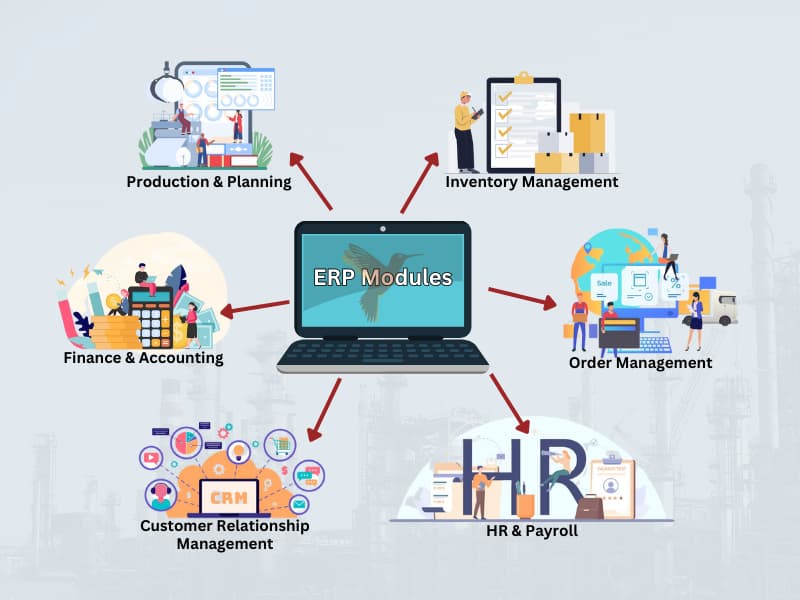The Enterprise Resource Planning (ERP) market has been growing steadily over the past few decades. One of the major drivers of ERP growth is the increasing demand for integrated business processes. As businesses become more complex and global, they need a unified platform that can integrate all their business processes, from finance and accounting to supply chain management and customer relationship management. ERP systems provide a centralized database that can support these integrated processes. The ERP modules offers a wide range of benefits for the manufacturing industries.

ERP Modules and Their Business Benefits :
Finance and Accounting :
The finance and accounting module in ERP (Enterprise Resource Planning) software is designed to manage and automate the financial processes of a business. It typically includes features for general ledger, accounts payable, accounts receivable, cash management, financial reporting, and budgeting. Here are some of the benefits of using the finance and accounting module in ERP:
- Improved Financial Visibility: ERP finance and accounting modules provide a real-time view of financial data across the organization. This visibility can help business leaders make informed decisions about cash flow, profitability, and growth.
- Streamlined Processes: ERP finance and accounting modules automate many routine financial processes, such as accounts payable and accounts receivable, reducing the need for manual intervention. This can help businesses save time and reduce errors.
- Accurate Financial Reporting: ERP finance and accounting modules provide standardized financial reports, ensuring compliance with accounting standards and regulations. This can help businesses avoid financial penalties and reputational damage.
- Enhanced Financial Controls: ERP finance and accounting modules provide controls to ensure that financial transactions are accurate and complete. This can help businesses reduce the risk of fraud and ensure compliance with internal controls.
- Better Cash Management: ERP finance and accounting modules provide tools to manage cash flow, including cash forecasting and bank reconciliation. This can help businesses improve liquidity and manage financial risk.
- Faster Closing Process: ERP finance and accounting modules automate the financial closing process, reducing the time and effort required to close the books each month. This can help businesses improve efficiency and reduce the risk of errors.
Production and Planning :
The Production and Planning module in an ERP (Enterprise Resource Planning) system is a software application designed to manage and optimize the production process of a company. This module helps to plan, schedule, and control the production process by integrating different functional areas such as materials, production, sales, and finance.
The benefits of using a Production and Planning module in an ERP system include:
- Improved Efficiency: The production and planning module can help to optimize the production process by providing real-time information on the status of production, inventory levels, and resource availability. This can lead to increased productivity, reduced lead times, and improved on-time delivery.
- Better Resource Utilization: By integrating production planning with inventory management, companies can avoid stock-outs and overstocking of materials, resulting in better resource utilization.
- Enhanced Quality Control: The module can track the quality of materials and products at every stage of the production process, helping to identify and resolve quality issues before they impact the final product.
- Accurate Forecasting: By providing real-time data on production and inventory levels, the module can help companies to accurately forecast demand and plan production accordingly.
- Improved Communication: The module can help to improve communication between different departments involved in the production process, such as sales, production, and finance, by providing a centralized platform for information sharing.
- Cost Reduction: The production and planning module can help to reduce costs by minimizing waste, optimizing resource utilization, and improving production efficiency.
Order Management :
Order management in ERP (Enterprise Resource Planning) refers to the process of managing customer orders from start to finish. This includes receiving, processing, fulfilling, and tracking customer orders.
The order management module in an ERP system provides a centralized platform for managing orders, which can help to improve efficiency, accuracy, and customer satisfaction. Some of the benefits of using an order management module in an ERP system include:
- Streamlined Order Processing: The module can automate many of the manual tasks involved in order processing, such as order entry, verification, and tracking. This can help to reduce errors, save time, and improve order processing speed.
- Improved Order Fulfillment: The module can help to optimize inventory levels and ensure that the right products are available to fulfill customer orders. This can help to reduce backorders, improve order fulfillment speed, and increase customer satisfaction.
- Enhanced Customer Service: The module can provide real-time information on order status, shipping information, and delivery dates, allowing customer service teams to provide timely and accurate updates to customers.
- Improved Forecasting: The module can provide insights into customer demand, allowing companies to better forecast sales and plan inventory levels accordingly.
- Better Data Management: The module can provide a centralized platform for managing customer and order data, which can help to improve data accuracy and reduce the risk of data errors.
- Increased Efficiency: The module can help to automate many of the manual tasks involved in order processing, allowing companies to process orders more quickly and efficiently.
Customer Relationship Management :
The CRM (Customer Relationship Management) module in an ERP (Enterprise Resource Planning) system is a software application designed to manage and optimize the interactions between a company and its customers. This module helps to manage customer data, sales activities, marketing campaigns, and customer service operations.
The benefits of using a CRM module in an ERP system include:
- Improved Customer Engagement: The CRM module can help companies to better understand their customers by providing a centralized platform for managing customer data. This can help companies to personalize their interactions with customers and build stronger relationships.
- Increased Sales: The CRM module can help companies to manage their sales activities more effectively, by providing real-time data on customer preferences, sales trends, and sales performance. This can help sales teams to identify opportunities, prioritize leads, and close more deals.
- Better Marketing: The CRM module can help companies to manage their marketing campaigns more effectively, by providing insights into customer preferences, behavior, and demographics. This can help companies to target their marketing efforts more effectively, improve response rates, and increase customer engagement.
- Enhanced Customer Service: The CRM module can help companies to manage their customer service operations more efficiently, by providing a centralized platform for managing customer interactions, inquiries, and complaints. This can help companies to resolve issues more quickly and improve customer satisfaction.
- Improved Data Management: The CRM module can help companies to manage customer data more effectively, by providing a centralized platform for storing, updating, and analyzing customer information. This can help to improve data accuracy, reduce data duplication, and enhance data security.
- Increased Efficiency: The CRM module can help companies to automate many of the manual tasks involved in customer management, such as data entry, lead tracking, and customer service operations. This can help to improve efficiency, reduce costs, and free up time for other tasks.
Inventory Management :
The Inventory Management module in an ERP (Enterprise Resource Planning) system is a software application designed to help companies manage their inventory levels and optimize inventory operations. This module provides real-time data on inventory levels, inventory movements, and inventory costs, helping companies to make informed decisions about inventory management.
The benefits of using an Inventory Management module in an ERP system include:
- Optimize Inventory Levels: The module can help companies to maintain optimal inventory levels by providing real-time data on inventory levels, inventory movements, and demand trends. This can help to reduce inventory costs, minimize stock-outs, and improve customer satisfaction.
- Improved Inventory Planning: The module can help companies to plan inventory levels more effectively by providing insights into inventory turnover, reorder points, and safety stock levels. This can help to reduce inventory costs and minimize the risk of stock-outs.
- Better Cost Management: The module can help companies to manage inventory costs more effectively by providing insights into inventory valuation, carrying costs, and obsolescence. This can help to reduce inventory costs and improve profitability.
- Improved Order Fulfillment: The module can help companies to optimize their order fulfillment process by providing real-time data on inventory availability, order status, and shipping information. This can help to improve order fulfillment speed and increase customer satisfaction.
- Enhanced Supply Chain Visibility: The module can help companies to improve supply chain visibility by providing real-time data on inventory movements, demand trends, and supplier performance. This can help companies to identify supply chain issues early and take corrective actions.
- Better Data Management: The module can help companies to manage inventory data more effectively by providing a centralized platform for inventory management. This can help to improve data accuracy, reduce data duplication, and enhance data security.
HR and Payroll :
The HR (Human Resources) and Payroll module in an ERP (Enterprise Resource Planning) system is a software application designed to manage employee data, payroll processing, and HR operations. This module provides a centralized platform for managing employee data, automating payroll processing, and streamlining HR operations.
The benefits of using an HR and Payroll module in an ERP system include:
- Streamlined HR Operations: The module can help companies to automate many of the manual tasks involved in HR operations, such as employee data management, leave management, and performance management. This can help to improve efficiency, reduce errors, and free up HR staff to focus on strategic tasks.
- Accurate Payroll Processing: The module can help companies to automate payroll processing, including salary calculations, tax deductions, and benefit deductions. This can help to reduce errors, ensure compliance with payroll regulations, and improve payroll processing speed.
- Improved Employee Self-Service: The module can provide a self-service platform for employees to access their own HR and payroll data, including pay stubs, tax forms, and time off requests. This can help to improve employee engagement and reduce HR administrative workload.
- Enhanced Compliance: The module can help companies to ensure compliance with HR and payroll regulations, including labor laws, tax regulations, and benefits regulations. This can help to reduce compliance risks and avoid costly penalties.
- Better Data Management: The module can help companies to manage HR and payroll data more effectively, by providing a centralized platform for employee data management. This can help to improve data accuracy, reduce data duplication, and enhance data security.
- Increased Efficiency: The module can help to automate many of the manual tasks involved in HR and payroll operations, allowing companies to process HR and payroll tasks more quickly and efficiently.
Conclusion :
ERP systems are necessary for businesses as they can improve efficiency, reduce costs, improve decision-making, enhance customer satisfaction, and streamline operations across the organization. With an ERP system, businesses can better manage their resources and respond quickly to changes in the market, giving them a competitive edge.



